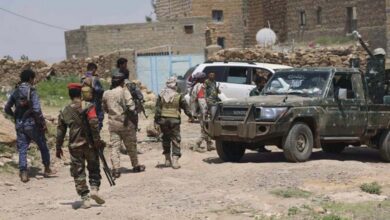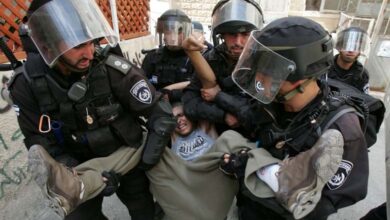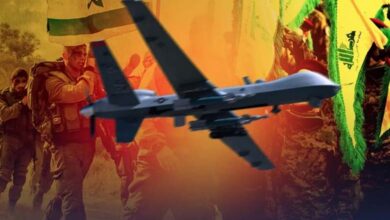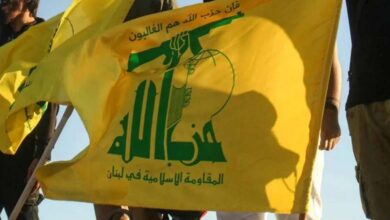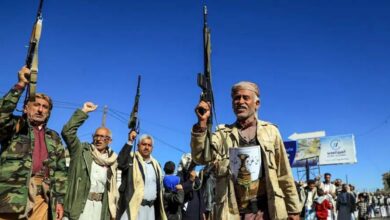Gheniwa’s Blood Strangles Dbeibah… Tripoli’s Nero Burns in His Own Fire
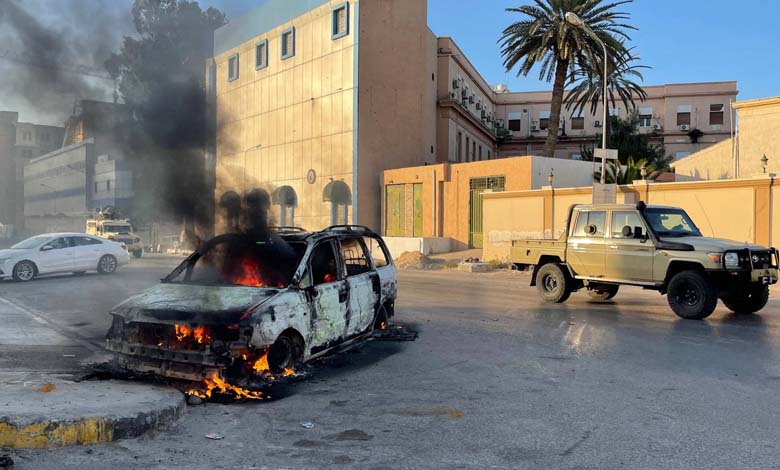
The killing of one of Tripoli’s most powerful militia leaders, Abdelghani al-Kikli — known as “Gheniwa” — was expected to give Abdulhamid Dbeibah full control of the Libyan capital.
-
Political Stalemate Brings Militias in Western Libya Back into the Spotlight
-
Is Libya Becoming a Hub for Exporting Armed Militias to Africa?
But the Prime Minister of the expired Government of National Unity quickly saw his plans go up in flames — literally. What began as clashes turned into full-blown battles between rival militias vying for power and aligned with opposing political factions.
Despite a surface-level calm, the city has yet to recover. Gheniwa’s assassination — he was the head of the “Stability Support Apparatus,” established in 2021 under the Presidential Council — deeply shook the country’s fragile equilibrium.
Worse still, the killing sparked a wave of public outrage against Dbeibah, with growing calls to overthrow his government amid fears that collapsing militia alliances could plunge Libya back into chaos.
-
Libyan candidates talk and militias mobilize as electoral process collapse
-
Libyan Presidential Council Decrees: A Return Ticket to the Political Spotlight
Cautious Statements
On his official Facebook page, Dbeibah issued carefully worded statements. In his first message — released the day Gheniwa died — he avoided using terms like “killed” or “eliminated,” opting instead for vague expressions like “what happened” and “what was achieved.”
He described the incident as “a crucial step toward ending illegal armed groups,” and praised the Interior and Defense Ministries for “establishing security and asserting state authority in Tripoli.”
In a second statement issued Thursday, Dbeibah hinted at responsibility for the operation, though some wording remained ambiguous.
-
Clashes, Divisions, and Delayed Solutions… Libya on the Brink of Explosion
-
Weapon Chaos in Libya: Zawiya under the Grip of the Al-Farr and Al-Qasab Conflict
He stated: “The path toward building state institutions and dismantling a decade of organized crime is not easy. What we did in Abu Salim was a necessary step to end a presence that had long flouted the law and committed serious human rights abuses.”
He added that “the security operation was carried out in an organized and calm manner, without confrontations,” referring to the action that led to Gheniwa’s death.
“Tripoli’s Nero”
Despite attempts to justify Gheniwa’s elimination as part of a campaign to weaken armed groups and assert authority, the outcome backfired: widespread public anger and a worsening security crisis.
-
Western Libya Ablaze: Bloody Clashes Turn Streets into Warzones
-
Corruption and Terrorism Financing Drive Washington to Suspend Aid to Libya
Violent protests erupted in various Tripoli neighborhoods — including Abu Salim, Souq al-Jumaa, and Ain Zara — with demonstrators demanding Dbeibah’s removal after bloody clashes.
Libyan analysts compared Dbeibah to Roman Emperor Nero, who burned Rome — saying the PM has set Tripoli ablaze only to find himself trapped in the fire.
Miftah Al-Qailoushi, a prominent figure from western Libya, said: “The capital is under the occupation of the Muslim Brotherhood and their militias.”
He added: “Libyans can no longer tolerate this reality. They seized the first opportunity to voice their rejection of a government they see as a façade draining the nation’s wealth.”
-
Transfer of Armed Elements from Syria to Libya… A New Muslim Brotherhood Plan
-
Militia Power: The Kidnapping of an Intelligence Officer Denies Europe Access to Libyan Gas
Al-Qailoushi argued that Dbeibah’s government deepened internal divisions, and the recent clashes reignited those fractures — even though Parliament had withdrawn confidence from his administration over two years ago.
He said the protests reflected widespread popular anger, as Tripoli includes people from across the country. He noted that the latest clashes left over 200 dead, yet Dbeibah clings to power “at any cost.”
also said the Muslim Brotherhood has lost control of most of Libya, with only limited pockets of influence remaining in Tripoli.
-
Tension rises in Western Libya after assassination of one of the biggest human traffickers
-
The Libyan Eastern Government Searches for Abducted Deputy
Turning on Former Allies
Libyan political figure Ramadan Shleig stated that Dbeibah made a critical mistake in thinking he could use militias and later discard them.
explained that western Libya — especially Tripoli — lacks regular military institutions and is dominated by armed groups with tribal and local loyalties that emerged after the 2011 regime collapse.
Shleig said that successive governments, particularly Dbeibah’s, financed and legitimized these groups — only to now find themselves in direct confrontation with them.
-
Libya Caught in the Crossfire of Great Power Rivalries… What Are the Possible Scenarios?
-
Crime, violence, extortion, and looting of people’s properties and state resources… What are the Muslim Brotherhood doing in the Libyan capital?
He asked:
“How can a government fund militias for five years, then suddenly decide to eliminate some and use others against their former allies?” — calling it a sign of political and security mismanagement.
He added: “The Libyan street is angry. While scholarships, medical treatments abroad, and basic services are suspended, millions are spent on armed groups that provide no national value.”
Losing Bets
Strategic affairs researcher Mohamed Mtairid said Dbeibah believed eliminating Gheniwa would give him complete control of Tripoli.
-
Clashes Between Militias in Tripoli Mar Eid Atmosphere
-
Complications Hindering the Evacuation of Militias from Tripoli
He noted that Gheniwa dominated the Bouslim municipality — one of Tripoli’s largest — and held significant influence.
The assassination caused a major shock in Libyan society and was seen as a betrayal of a former ally. As a result, many sided with the Radaa (Deterrence) militia — despite its own questionable record — believing Dbeibah now posed the greater threat.
Mtairid said the move shows a lack of wisdom and political foresight. Dbeibah, he argued, was trying to send a message to the international community that he remains a “key player” in Libya’s political equation after failing to hold elections for over five years.
-
The Libyan Scene is Turbulent… What Comes after the Clashes in Tripoli?
-
Violent Clashes Between Major Factions Threaten Stability in the Libyan Capital
But the move failed in the face of public will, with many now seeing Dbeibah as a “Libyan Nero,” ready to burn the capital to remain in power.
The recent clashes have killed and injured dozens of civilians and caused massive damage to infrastructure and private property — sparking unprecedented public fury against Dbeibah’s government.


